|
|
|
Sort Order |
|
|
|
Items / Page
|
|
|
|
|
|
|
| Srl | Item |
| 1 |
ID:
172114
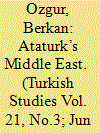

|
|
|
|
|
| Summary/Abstract |
The main argument of this paper is that Turkey had close relations with Middle Eastern states during the Atatürk period, which is contrary to the literature that claims the opposite because of Turkey’s Western-oriented ideology. The article asks why Turkey as a Western-oriented state sought to have close relations with Middle Eastern states. To answer this question, the article uses discourse analysis focusing on Middle Eastern leaders’ visits as represented in Turkish public discourse. Accordingly, it proposes two main answers. Firstly, the paper argues that the new state’s relations with Middle Eastern countries played an important role in legitimation of its Westernization projects in the eyes of its citizens. Secondly, the Turkish state marginalized rival political discourses, mainly Islamism, by proving that even Muslim majority countries wanted to imitate modern Turkey.
|
|
|
|
|
|
|
|
|
|
|
|
|
|
|
|
| 2 |
ID:
109589
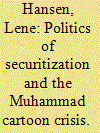

|
|
|
|
|
| Publication |
2011.
|
| Summary/Abstract |
A broad array of authors and schools have influenced Barry Buzan and Ole Wæver's formulation of securitization theory, including John L. Austin, Jacques Derrida and Carl Schmitt. This article draws attention to and strengthens the post-structuralist elements in the writings of Buzan and Wæver, as this part of the theory has received less attention than those attributable to Schmitt and Austin. Starting from securitization theory as developed by Buzan and Wæver and engaging with later expansions of the theory, I suggest a post-structuralist framework built around three questions: Through which discursive structures are cases and phenomena represented and incorporated into a larger discursive field? What is the epistemic terrain through which phenomena are known? And, what are the substantial modalities that define what kind of an issue a security problem is? The last part of the article brings this framework to bear on the 'Muhammad cartoon crisis' that began with the publication of 12 cartoons depicting the Prophet Muhammad in the Danish newspaper Jyllands-Posten in 2005.
|
|
|
|
|
|
|
|
|
|
|
|
|
|
|
|
| 3 |
ID:
108056
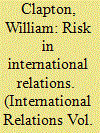

|
|
|
|
|
| Publication |
2011.
|
| Summary/Abstract |
Risk is a concept that has recently filtered through into International Relations (IR). However, the literature on risk, risk management and IR is still comparatively small and there is still significant scope for the theorisation of these concepts in an IR context. Thus far, the literature on risk and IR has been largely characterised by the debate between critical realist, constructivist and post-structuralist approaches to risk. At the core of these debates is the ontological question of whether risks are 'real' or not. However, this article will suggest that these ontological debates have grown stale and are unhelpful to furthering the research agenda on risk and IR. As this article will demonstrate, we need to systematically develop ways for both explaining risk identification, assessment and management -what might be termed 'riskisation' - and why particular forms of risk management emerge in particular situations and not others.
|
|
|
|
|
|
|
|
|
|
|
|
|
|
|
|
| 4 |
ID:
119231
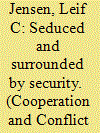

|
|
|
|
|
| Publication |
2013.
|
| Summary/Abstract |
Combining elements of the Copenhagen school's securitization theory with a Foucauldian discourse analysis, this article examines certain discursive processes that emerged in the wake of Norway's 2005 High North Initiative. The Norwegian government's explicit politicization of energy issues appears to have acted as door opener, letting 'security' in to colonize the High North discourses once more. Russia is again firmly positioned as the 'radical other', leaving the discursive field open to various forms of securitizing discourses. The post-2005 discursive field of the Northern areas is, in many ways, more open-ended, complex and confusing than ever. The opening up and expansion of the concept of High North security means that 'everything' is seen as having a security potential. What does seem clear is the increasing presence of security in primary texts and the media debate: entry to and credibility in the discourse depends on 'security speak' across an ever-widening array of thematic contexts. The article also argues that a combination of securitization theory and discourse analysis seems a fruitful way forward in shifting more focus towards the active and important role of the audience in securitizing processes.
|
|
|
|
|
|
|
|
|
|
|
|
|
|
|
|
| 5 |
ID:
137265
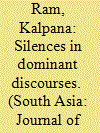

|
|
|
|
|
| Summary/Abstract |
Subaltern Studies continues to be generative for understanding the present, provided we expand our evaluation beyond the question of ‘who is subaltern?'. This paper considers instead underlying methodological orientations that outlive their original empirical context, lending themselves to fresh applications. The original method trained us to notice gaps in governmental discourse, silences that underlie its claims to know and administer all within its domain. Based on ethnographic work in rural south India, the paper argues that despite the radical expansion of governmental discourse, it still does not coincide with the everyday practices people continue to inhabit. These practices shape, for example, rural women's everyday poesis in the stories they tell of injustices they have suffered, and the way these injustices erupt as disorder in the body's relationship to the world. To be able to write about these silences minimally requires, however, a second orientation, also present in early Subaltern Studies. This is the underlying epistemic confidence that it is possible, despite the odds, to understand better the meanings and workings of practices that may no longer constitute coherent or self-sufficient worlds—but which nevertheless continue to enjoy a vital and lively presence for subalterns, and for us all.
|
|
|
|
|
|
|
|
|
|
|
|
|
|
|
|
| 6 |
ID:
105952


|
|
|
|
|
| Publication |
2011.
|
| Summary/Abstract |
This article aims to show the theoretical added value of focussing on discourse to study identity in international relations (IR). I argue that the discourse approach offers a more theoretically parsimonious and empirically grounded way of studying identity than approaches developed in the wake of both constructivism and the broader 'psychological turn'. My starting point is a critique of the discipline's understanding of the 'self' uncritically borrowed from psychology. Jacques Lacan's 'speaking subject' offers instead a non-essentialist basis for theorizing about identity that has been largely overlooked. To tailor these insights to concerns specific to the discipline I then flesh out the distinction between subject-positions and subjectivities. This crucial distinction is what enables the discourse approach to travel the different levels of analyses, from the individual to the state, in a way that steers clear of the field's fallacy of composition, which has been perpetuated by the assumption that what applies to individuals applies to states as well. Discourse thus offers a way of studying state identities without presuming that the state has a self. I illustrate this empirically with regards to the international politics of whaling.
|
|
|
|
|
|
|
|
|
|
|
|
|
|
|
|
|
|
|
|
|